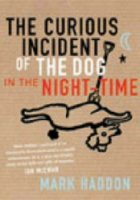 The Curious Incident of the Dog in the Night-Time by Mark Haddon (Jonathan Cape, 2003)
The Curious Incident of the Dog in the Night-Time by Mark Haddon (Jonathan Cape, 2003)
As with Born to Run, I picked up this book because it was lying around and the title caught my eye. I don't recommend it, but that doesn't mean I found it easy to put down. I had intended to take the book on the airplane with me, but finished before my boarding pass was printed. The story is initially compelling and the premise unique: a murder mystery through the eyes of a teen with Asperger Syndrome. Whether the portrayal of the way someone with Asperger Syndrome might think or act is realistic or not, I can't say. But it's an interesting viewpoint, and I loved the math problem at the end (though it was somewhat poorly worded) and the fact that the chapter numbers are all prime.
The age of the protagonist, and the length and easy reading level of the story might mislead someone into thinking this is a children's book, but it's not. Then again, it's not an adult book, either. If the language and subject matter make it unsuitable for the young, the meagre story line (too thin to be called a plot) and unsatisfactory ending make it unsuitable, period. The main character's handicap is no reason for the author to ignore the basic rules of mystery writing.
I am not categorically against profanity in books and movies, although for the most part I find it unnecessary, a cheap and lazy way for authors to make their point—as it is in real life. In the case of this book, however, the foul language is beyond gratuitous. It is pointless, nauseating, and killed what little empathy I had with the characters. It's a bit disconcerting to find I have more in common with autistic Christopher than with his bizarre, potty-mouth parents.
As much as I actually enjoyed reading The Curious Incident of the Dog in the Night-Time, the more I reflect, the more disturbing I find it. Worse than the profanity, worse than the poor story-telling—the book is dismal. There is no joy, little love, less goodness, and only a minuscule potential for hope. Despair and disillusion abound, along with anger, self-centeredness, and minor obscenities that remind me of the Objective Room in C. S. Lewis's That Hideous Strength: nothing so gross as to arouse the protective mechanism of disgust, but everything just a little bit wrong, calculated to reach deep into the unprotected psyche. Some would say this is real, this is life, and books should reflect reality. I reply that it is only part of real life, and that the love, joy, kindness, and triumph I see every day are at least as real and a whole lot more inspiring. If I grant that all of us, at our worst moments, will find within ourselves all the ugliness modern literature can portray, and more, I still insist that depressing books do not help. I need positive role models, not negative ones. A muddy rag cannot clean a grimy face.
What a great idea this was for a book! I wish it had been given a better treatment.
Thanks for the review. I agree on many points, but my reception was different on some counts that I'd like to mention.
First, I thought it wasn't bad for the mystery to fall somewhat flat. In a sense, it allows the author to show that dysfunctionalities that we can easily guess at seem a total mystery to one not versed in our skills of dissimulation and duplicity. Not only is the behaviour incomprehensible, it is inconceivable.
Second, the way Christopher narrates and reports vocabulary and behaviour verbatim shows starkly how ugly the people around him are and act. Although you're right that the element of redemption or positive inspiration are missing, behaviour and character traits that would in other mainstream novels be normal, interesting, and acceptable, are shown for the ugliness they are in more "rational" eyes.
I'm not sure if the author intended what I saw and mention above, nor how many people will pick up on it, but I see those as the positive aspects of the book. They are certainly unusual for a mainstream book.
Now if only that honesty with the human condition became usual, and was presented in a more palatable way!
You are right, I'm sure. Perhaps it shows that I have even more autistic traits than I thought. :) It certainly shows why I generally avoid mainstream novels.
Excerpt: A Little Princess, by Frances Hodgson Burnett (Grosset & Dunlap, New York, 1965) I picked this book up to re-read it because I needed an antidote to The Curious Incident of the Dog in the Night-Time. You can tell this particular c...
Weblog: Lift Up Your Hearts!
Date: January 9, 2010, 10:22 am


